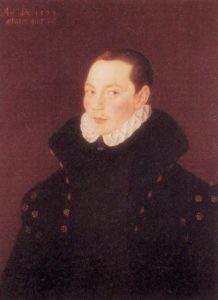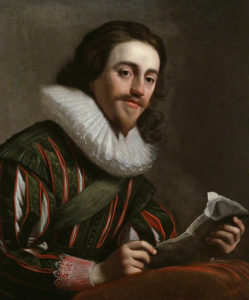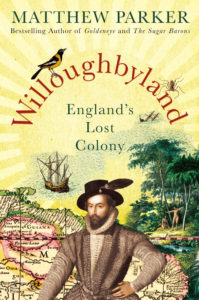by Matthew Parker
Francis Willoughby would be described by contemporaries as both charming and self-centered; his military and political careers would show him to be at times impetuous and at others indecisive. In many ways he was a visionary, but he was also an inveterate plotter and schemer.

He was born around 1603 into a wealthy landed Lincolnshire family, inheriting the title Baron Willoughby of Parham while still a child. In 1628 he married well, to Elizabeth Cecil from one of the country’s richest dynasties, but perhaps more important to his future were his wife’s mother’s family, the Noells, who were amongst the most important financial backers of English exploits in the Caribbean. Thus Willoughby moved in circles more aware than most of the potential riches of the West Indies colonies.
During the 1630s, Francis Willoughby’s relationship with the Crown soured. Like many, he objected to Charles I’s efforts to rule – and raise revenue – without recourse to Parliament. As a Presbyterian, he opposed the King’s attempts in 1639 to impose Episcopal Church government on Scotland, and the following year was amongst a group of aristocratic signers of a petition to the King to recall Parliament and to listen to its grievances.
Charles bowed to pressure, but relations with the new Parliament deteriorated to the point of war. Francis Willoughby had been made a lord lieutenant of part of Lincolnshire, and in that capacity in March 1642 he was ordered separately by both the King and Parliament to raise local troops to fight their causes. He chose to obey the latter, although he wrote an apologetic letter to the King.

From the autumn he was colonel of a regiment of Horse under the Parliamentary general the Earl of Essex, and in January 1643 became commander-in-chief of Lincolnshire Parliamentary forces. As a military leader his achievements were modest at best. In July he captured Gainsborough but then lost it, followed by Lincoln. Willoughby was demoted, placed under the Earl of Manchester.
A success at Bolingbroke Castle in November was then followed by involvement in a disaster for Parliament at Newark, where a Roundhead arm y led by Sir John Meldrum was outmaneuvered and forced to surrender to a Royalist army half its size. The fallout included the accusation that Francis Willoughby’s men had refused to obey Meldrum’s orders.
y led by Sir John Meldrum was outmaneuvered and forced to surrender to a Royalist army half its size. The fallout included the accusation that Francis Willoughby’s men had refused to obey Meldrum’s orders.
Indeed, Francis Willoughby had gained a reputation for bickering with his fellow officers. He would shortly be forced to apologise in the House of Lords for quarrelling with the Earl of Manchester. Cromwell, on the other hand, linked Willoughby’s military failures with the license he allowed his men, complaining of ‘ungodly officers’, one of whom had supposedly ordered a constable ‘to bring him in some wenches’.
Francis Willoughby turned his energies to politics, leading the Presbyterian faction within Parliament and opposing the growing power of the army. He was a moderate, distrustful of the leveling principles taking hold of radical MPs and in the ranks: in 1644 he warned, ‘We are all hasting to an early ruin. Nobility and gentry are going down apace.’
This put him at loggerheads with the increasing sway in Parliament of ‘fierier spirits’. His brother-in-law Bulstrode Whitelocke warned that Willoughby was ‘in danger of his fortune, honour, and life, upon a new faction rising up, and all his former merits forgotten.’
Nevertheless, Francis Willoughby was elected leader of the House of Lords in August 1647; but in the meantime he had been making arrangements to cover all eventualities, reorganizing his assets and moving property to trustees.
Most importantly, he took measures to move money, and if necessary himself, out of the country altogether. Perhaps on the advice of his Noell in-laws, it was to the West Indies that he looked for a refuge.
MATTHEW PARKER spent part of his childhood in the West Indies. He has written for many national newspapers in the UK, contributed to numerous TV and radio programs, and lectured around the world. His bestselling and critically-acclaimed books include Monte Cassino, Panama Fever, The Sugar Barons, and Goldeneye, examining the importance of Jamaica in Ian Fleming’s James Bond novels.
